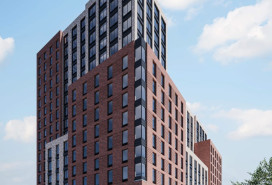What you can expect to pay for NYC condo or co-op insurance
- The cost of your premium depends on the value of your property and its contents
- Costs start at $300 per year, but the average price for NYC is closer to $700

Your policy should cover the cost to rebuild, the contents of your apartment, and liability.
iStock
New York City has never been particularly cheap, and annual insurance costs make living in the city even more expensive for condo and co-op owners.
Condo and co-op insurance—which protects your individual apartment—normally runs several hundred dollars a year. But premiums have gotten more expensive since 2020 thanks to inflation, higher construction costs, and a slowdown in the supply chain, said Loretta Worters, vice president of media relations at the Insurance Information Institute.
“Property insurance has seen an increase because of several factors,” Worters said. “Inflation is impacting condo and co-op owners much like the homeowners market in general. The cost of materials and labor has increased, so the cost to rebuild or repair a building or owners personal space is costing more. [And] insurance companies are increasing building limits to make sure the property is insured to its full value.”
Your policy’s cost will depend on the value of your home, its contents, if there’ve been previous accidents in your building, what kind of building you live in, and where you live, to name a few factors. Read on for what you can expect to pay this year, and why that number may be going up.
What does condo or co-op insurance cover?
Condo and co-op insurance is different from homeowner’s insurance because a condo or co-op building will have a master policy that protects the entire property, including its public spaces, and the board in the event of a lawsuit.
A master policy, however, doesn’t eliminate the need to insure your own unit. The building’s policy will not cover anything inside the four walls of your unit, so if there’s a flood or a fire, you’ll want insurance so you can rebuild and furnish your apartment—especially if you’ve renovated.
A condo or co-op insurance policy should cover the cost to rebuild your walls and flooring and redo any renovations, though your building will handle the basics, said Michael Conte, a managing partner at insurance firm Honig Conte Porrino.
“A lot of people are under the misconception that the building will come in and fix it up,” Conte said. “My experience shows that the building will come in and perhaps give you a white box, but after that it's up to you.”
Your policy should also cover the cost of replacing the contents of your apartment, including furniture, bedding, and artwork. (So if you happen to collect rare and expensive art, you’ll want a higher coverage limit and a more expensive policy).
Lastly, condo or co-op insurance covers liability, which protects you if someone is injured inside your apartment or an accident you’re responsible for—like a fire, or an overflowing bathtub—damages another unit.
“We've had cases where a pipe burst and, and it was the unit's responsibility for that particular pipe because they had renovated, and it trickled down many floors,” said Patti Clement, executive vice president of high net worth personal lines at HUB International. “That's liability.”
How much should I expect to pay?
Minimum: At the bare minimum, you should expect to pay around $300 per year for condo or co-op insurance, but that will offer very low levels of coverage, Conte said. A $300 policy will only cover $25,000 worth of your apartment’s contents, $300,000 in liability coverage, and $5,000 to rebuild.
That’s not nearly enough to cover rebuilding a Manhattan apartment, Conte said.
“For a small one bedroom in Manhattan, between architect fees, filing fees, and permits, you can be at $125,000 in a heartbeat,” Conte said.
Better: The average annual cost for condo or co-op insurance in NYC ranges from $640 to $770 per year, according to estimates from Nerdwallet and Insurance.com. But insurance prices can range from $1,500 and $5,000 per year for more expensive properties, Clement said.
Best: Your best policy will be aligned with the cost of replacing your furniture, renovations you paid for, and your belongings, Conte said. He also recommends getting a policy that will allow you to spend—at minimum—$225 per square foot on rebuilding your apartment, and one that has a liability coverage limit of at least $500,000. (Conte says it only takes a few dollars to increase your liability insurance from say $300,000 to $500,000, so he recommends paying up slightly for better coverage).
If you’re living large in a Manhattan penthouse, you could be looking at thousands of dollars a year in insurance coverage, Conte said.
“We insure one apartment downtown and the premium is $90,000 a year,” Conte said. “We’re insuring it for about $8 or $9 million so it seems like an astronomical premium when you compare it to around $600 for the year.”
What kind of annual increases should I expect?
Most insurers will tack on a 3 to 5 percent premium increase each year, but your policy could rise even further this year, Clement said.
If your building had previous claims, such as water damage, your premium will likely increase, Clement said. But national trends—including higher inflation, a supply chain slowdown, natural disasters that lead to insurance payouts—are all putting pressure on insurers to raise prices, Clement added.
Conte has seen increases of 4 to 5 percent, which he called slightly higher than normal “but not outrageous,” he said. Meanwhile, Clement has seen increases of 12 to 40 percent on policies.
“Right now, I would [the increases] are the worst,” Clement said. “I'm hoping that it will hopefully stabilize and go back to normal, but you're never gonna see the rates go down.”




























